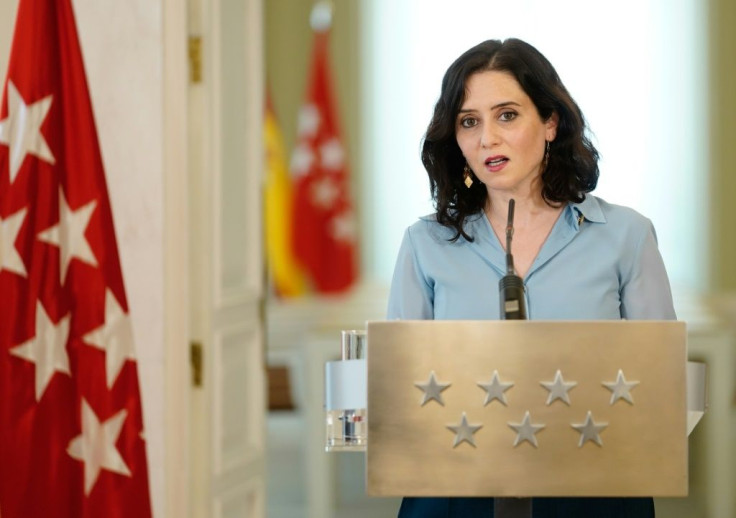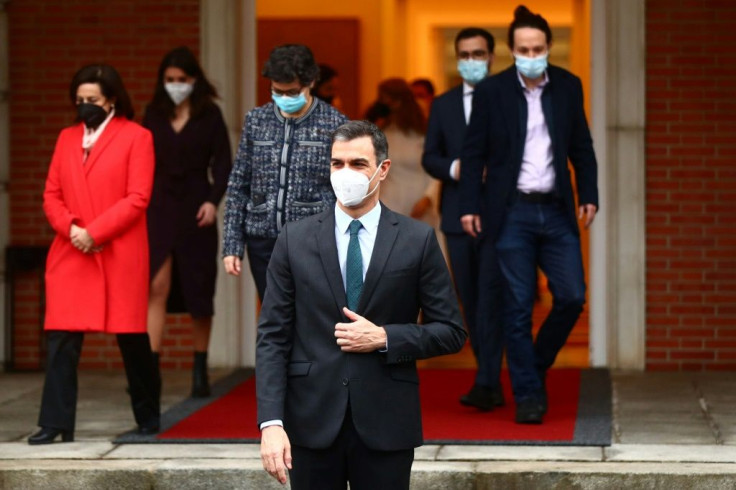Madrid Regional Head Calls Snap Election On May 4
The rightwing leader of Madrid's regional government, Isabel Diaz Ayuso, resigned Wednesday, dissolving its ruling coalition and calling a snap election on May 4 in Spain's wealthiest region.
The surprise move, which broke up the regional alliance between her Popular Party (PP) and the centre-right Ciudadanos, threatens to unravel other rightwing coalitions across Spain and could reshuffle the cards of the country's political scene.
Diaz Ayuso said the move was aimed at preventing Ciudadanos from tabling a no-confidence motion along with the Socialists, who serve in opposition in the Madrid government.
Her announcement came just hours after Ciudadanos broke its coalition deal with the PP in the southeastern Murcia region, in order to back a no-confidence motion filed by the Socialists, who dominate Spain's central government.
"I was forced to take this decision for the good of Madrid and Spain and against my repeated desire to complete my term in office," she said in a televised address.

"Madrid needs a stable government, clear ideas, ambitious solutions, stability... and this is not possible in the current circumstances."
But it was not immediately clear whether the early elections would go ahead after it emerged the Socialists and Mas Madrid, a tiny leftist party, managed to table no-confidence motions just ahead of her resignation.
The regional parliament cannot be dissolved if a no-confidence motion has been tabled, setting the stage for a possible legal challenge to the snap election call.
Diaz Ayuso, 42, has made headlines for her vociferous opposition to Socialist Prime Minister Pedro Sanchez's government, and for her refusal to impose strict virus restrictions.

Unlike many other Spanish regions, she insisted on keeping bars and restaurants open, saying it was essential to protect the local economy, while blasting Sanchez's measures as "authoritarian".
Madrid is the only region which has opposed the central government's call for travel between Spain's different regions to be banned over Easter to slow the spread of the virus.
Although Diaz Ayuso's relaxed approach to restrictions has been applauded in some quarters, Madrid has Spain's highest incidence of the virus after the north African enclaves of Ceuta and Melilla.
Holding snap polls in this region of nearly seven million people appears to be aimed at shoring up the political capital she has likely earned through resisting pressure to impose tighter virus restrictions.
"I can't allow Madrid to lose its freedom," Diaz Ayuso said, indicating the vote would allow residents to choose "between Socialism and freedom".
"We benefit from freedoms and rights that don't exist in all of Spain," she said.
"The way of life in Madrid is unique."
Aside from Madrid and Murcia, the PP and Ciudadanos have coalition agreements in two more of Spain's 17 regions and in several municipalities, raising questions as to whether these alliances will survive.
Ignacio Aguado, who heads Ciudadanos in the Madrid region, called Diaz Ayuso's move "irresponsible" at a time when the region's hospitals are full of coronavirus patients.
"We are doing the best we can for our country. But there are those who are only interested in their personal or electoral interests and that is a problem for this country," he told Cadena Ser radio after Ayuso spoke.
© Copyright AFP 2024. All rights reserved.





















